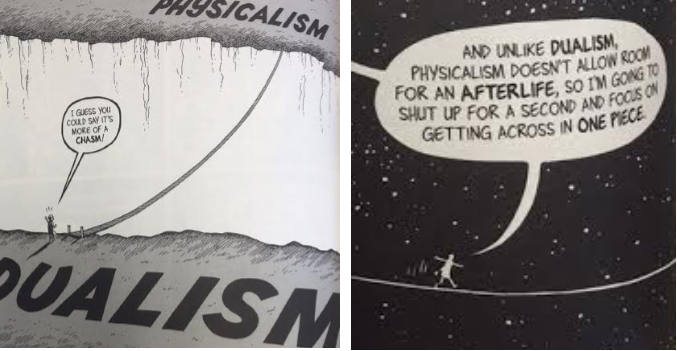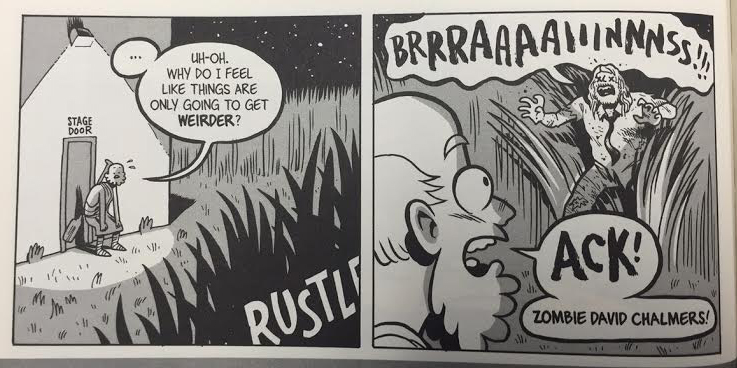
Cartoon Introduction to Philosophy
The Cartoon Introduction to Philosophy is out! By philosopher Michael Patton (Montevallo) and illustrator Kevin Cannon, the book stars Heraclitus as the reader’s guide and companion through various philosophical topics, including logic, perception, minds, free will, god, and ethics. At over 150 pages, it has the heft and look of a big graphic novel, and it’s all about philosophy.
It does a good job of laying out the basics, making clear the fundamental disputes, and doing so through humorous images and story lines.
I let my kids take it for a test run. They seem to be enjoying it. Some of the vocabulary in the book is a bit sophisticated or jargony for young kids, but my oldest (age 11) found the book’s notes and glossary quite helpful in this regard. He likes the illustrations and “funny parts” and said he learned about “some of the interesting problems philosophers have to solve.” I’ll take it.
Since philosophy is generally not taught pre-college (at least in the United States), I think books like this can be a good way of spreading information to young people about what philosophy is. It would be great to have a copy in every school library, for example, or in every doctor’s waiting room.
The book is on sale here. You can also visit the website of the publisher (Hill and Wang, a division of Farrar, Straus and Giroux) to learn more about it. They are currently advertising the book here at Daily Nous and clicking on their ad will take you to the right page.
In the meanwhile, if you know of other philosophy done in cartoon or comic strip style, please post about it in the comments.





http://www.consciousness.it/RM_Cartoons.php
http://en.wikipedia.org/wiki/Logicomix
http://en.wikipedia.org/wiki/Action_Philosophers!
There’s Zhuangzi Speaks (http://www.amazon.com/Zhuangzi-Speaks-The-Music-Nature/dp/0691008825) and then there’s a whole series on the Analects drawn by Adam Sia
Physicalism doesn’t allow room for an afterlife? As anyone who has taken philosophy of religion knows, that’s not obvious. Hopefully the book isn’t full of similar blunders.
Yes, my god, it would be horrific if an introductory cartoon guide to philosophy designed to inspire general interest in the subject contained errors any specialist in a subfield could spot.
Even worse, it doesn’t use the original Greek in its discussion of Plato.
Less philosophical in content, more story driven, than the excellent examples from Nobody Important above, but still interesting:
http://en.wikipedia.org/wiki/Epicurus_the_Sage
Let’s see, there are the books written and illustrated by Donald Palmer, Looking At Philosophy (several editions) and Does the Center Hold? Also, Logicomix: An Epic Search for Truth, by Apostolos Doxiadis and Christos H. Papadimitriou (2009) on the life of Bertrand Russell. And I have one copy from a series called Action Philosophers, from 2006. I love graphic novels (Neil Gaiman’s Sandman series is a special favorite of mine), and I think putting philosophy into this form is good way to exercise your right hemisphere, moving from abstract concepts into images. I wish I had the talent for cartooning–it’s a skill I’d like to develop in the future. You can get away with a lot of obfuscation in a flurry of words, words, words, but forcing yourself to sketch, at least mentally, the relationships you’re trying to describe is a good way to bring clarity to your writing.